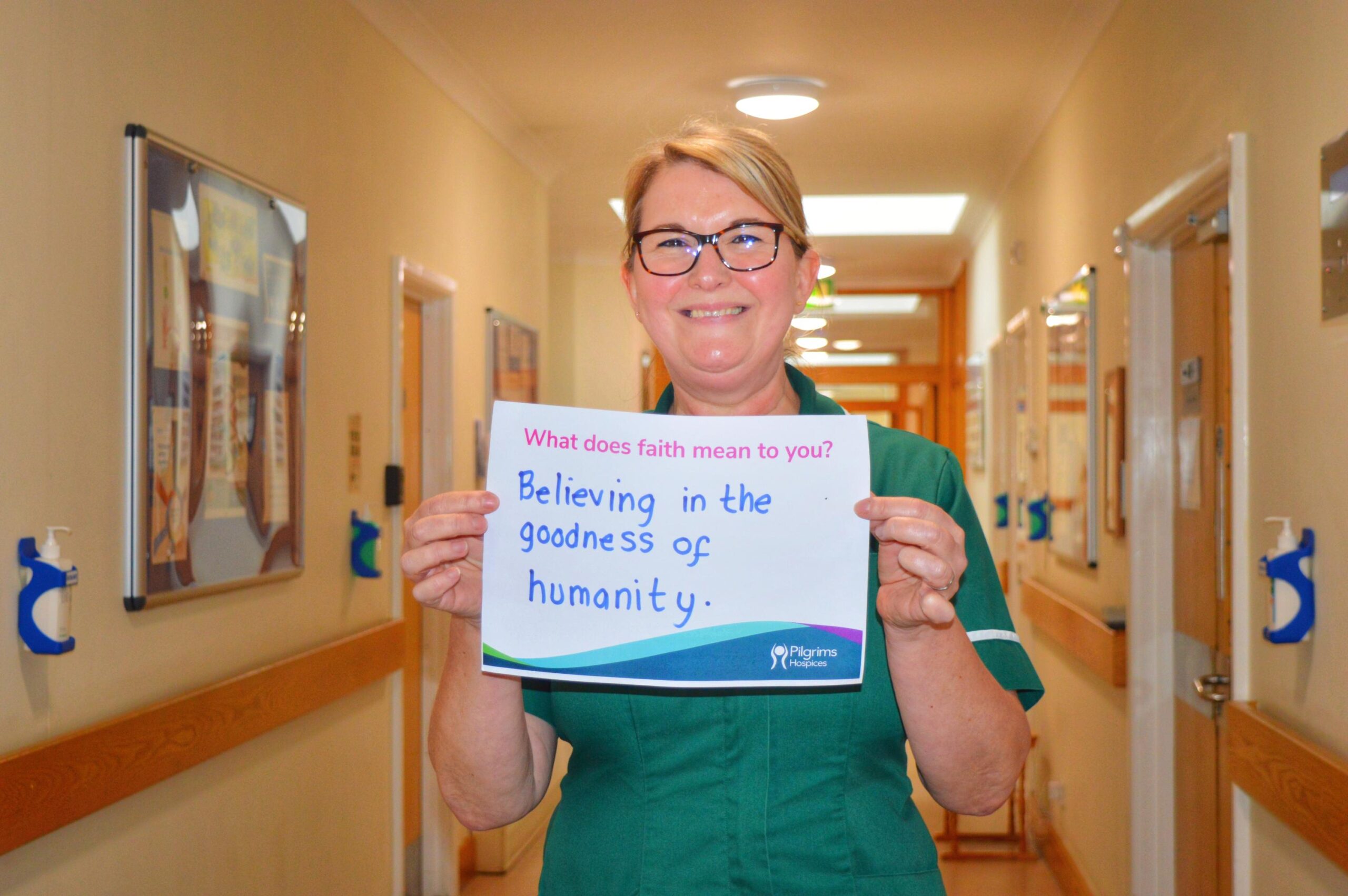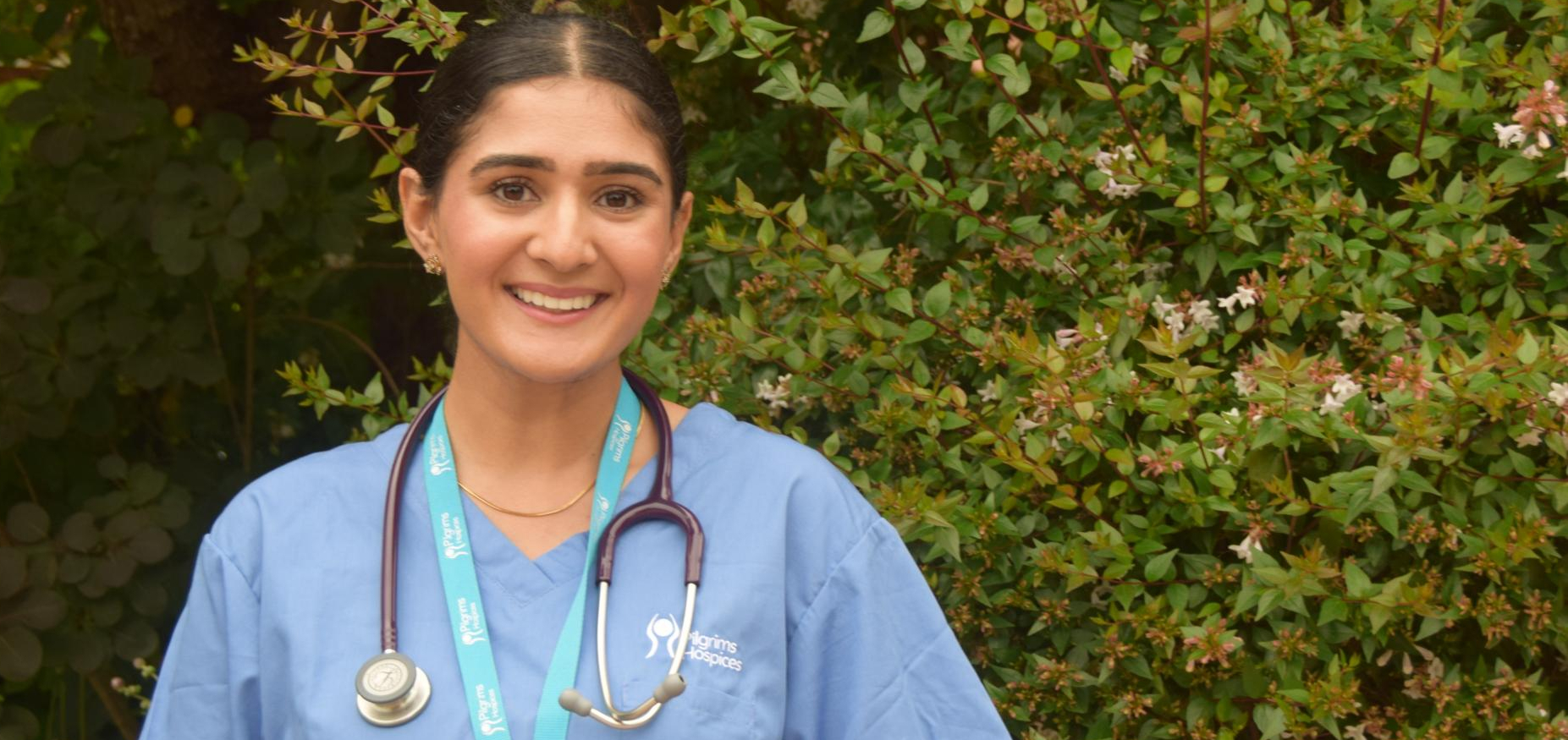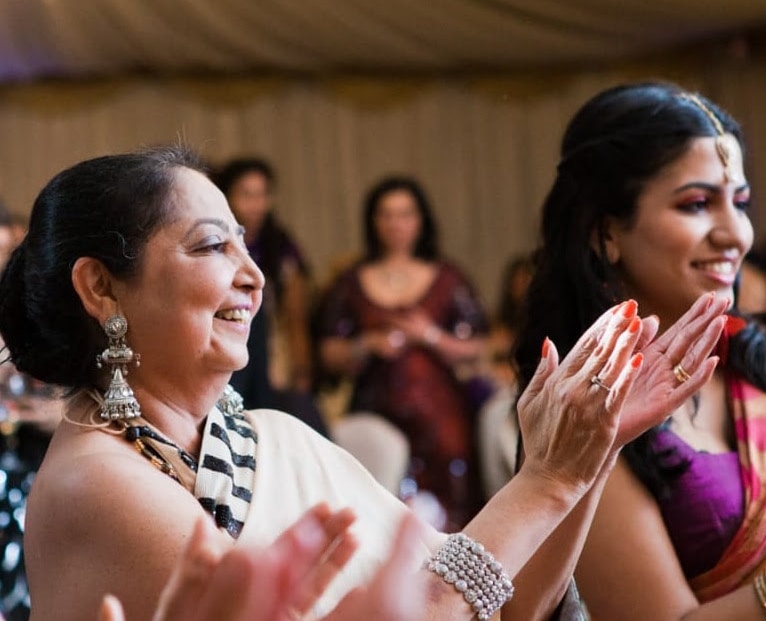Cat Darkins, Lead Spiritual Care Chaplain at Pilgrims Hospices, shares what she has noticed unites all cultures and faiths about death and dying:
Inter Faith Week 2025
Cultural approaches to death and dying
The following information has been created and shared by NHS Education for Scotland.
Baháʼí faith
The Baháʼí faith is an independent world religion that originated in Persia (now Iran) in the middle of the 19th century. Its founder is called Baha’u’llah (Glory of God).
Staff of either gender may care for the body.
The Baháʼí faith has no clergy. At the end of life, it would be hoped that family and loved ones would be present with the patient to provide comfort, support and prayer.
Baháʼís believe the body has been “the temple of the spirit” and treat the body of a deceased person with great dignity and respect. After death, the body is washed and wrapped in silk or cotton cloth and, for those over 15 years, a special burial ring is placed on the finger. Relatives may wish to do this themselves or may leave it to the funeral director.
It is preferable that burial should take place as soon as possible, but no time limit is specified. Baháʼí law prescribes that burial should take place at a distance of no more than one hour’s journey from the place of death. The body should not be cremated or embalmed. Funerals are normally arranged by the family of the deceased if available, or on occasions by the Baháʼí Assembly.
Brahma Kumaris
Brahma Kumaris is a worldwide spiritual movement dedicated to personal transformation and world renewal.
Brahma Kumaris favour cremation over burial.
Dedicated Brahma Kumaris would prefer the body to be in special white clothes, although there is some flexibility in this.
Details of the funeral arrangements are always discussed with the family of the deceased so that the family’s wishes are honoured.
Buddhism
The word ‘Buddha’ means ‘the awakened one’ and Buddhism (which can be understood as both a religion and a philosophy with clear ethical foundations), stems from the teachings of the historical Buddha, Siddhartha Gautama (lived 6ᵗʰ-5ᵗʰ century BCE in present-day Nepal).
The manner of consideration for the dying will depend on the Buddhist group.
A person’s state of mind at the moment of death is considered important across all Buddhist traditions. Practitioners in Tibetan traditions believe that the state of mind at the time of death influences how they experience the intermediate or ‘bardo’ states and thereafter the character of rebirth.
In these traditions, the belief is that the body and mind, or consciousness, separate at the time of death - the mind is not dependent on the body for its existence, and it does not die at the time of physical death, but continues in an intermediate state of “bardo” (customarily assumed to be around 7 weeks) before (generally) taking rebirth into another body. Thus, the time before and after physical death is a critical period for influencing the outcome of rebirth, into a higher or lower form.
Buddhists may like to have full information about their imminent death, to enable them to make preparations, although this may vary. Nearing the time of death, the state of mind should ideally be one of peace, so the patient may wish to meditate and ask for a quiet place. They may wish for a Buddha figure close by and may use a candle or incense stick.
Chinese faiths
Although there is a great variety of Chinese belief systems (including Christianity and Islam), the most prevalent influences are Buddhism, Confucianism, Taoism and veneration of ancestors.
Funeral and mourning customs vary widely in the Chinese tradition, often dependent upon wealth and status.
In the case of adults, the body is often simply bathed and covered in a white sheet, although some Chinese still follow the custom of clothing the body in white or traditional Chinese dress.
In the case of a child, some Chinese prefer things to be kept quiet and simple, with little or no fuss. In some instances, a coffin may not be used – simply a sheet. There is no formal funeral service for a child.
Chinese families do not like to be given back any of the child’s belongings as it is considered bad luck. On the death of a child, the burial takes place at once with no special ceremony.
Muslim Chinese may object to a post mortem.
Christianity
Christianity was founded around 2000 years ago in the area of modern-day Israel and Palestine. It is based on the teachings of Jesus of Nazareth, known as Christ (the anointed one).
Dying patients of all Christian denominations may wish the pastoral support of their own faith leader or welcome the services of the appropriate chaplain.
It is important that, whenever possible, Roman Catholic patients be offered the sacrament known as the Sacrament of the Sick.
If a baby is seriously ill, parents may wish to be offered a service of blessing or baptism for their baby. A chaplain or minister usually performs the service.
Some Christians do not practise infant baptism and may prefer that sick or dying babies receive a blessing instead.
If a baby is stillborn, or a child has died, many parents will also seek a service of blessing or baptism.
Many Unitarian Christians support the right to assisted dying and may decline certain treatments or have an ‘advance directive’ in place declining some interventions.
Mormon
The Church of Jesus Christ of Latter-day Saints (LDS) was founded in America in the early 19th century by Joseph Smith. The Bible and Book of Mormon are essential scriptures for Latter-day Saints.
There are no special rituals associated with dying or death for any age group.
After death, a deceased member should be washed and dressed in a shroud.
An ‘endowed’ Latter-day Saint should be buried wearing special undergarments and other special clothes, and members of the Church will dress the body before burial, by arrangement with the funeral director.
Generally, cremation is not encouraged, although the family of the deceased must decide on either burial or cremation.
Hinduism
Hinduism originated near the river Indus over 5,000 years ago, although elements of the faith are much older. The Hindu tradition has no founder and is best understood as a group of closely connected religious traditions rather than a single religion.
It represents a complete way of life and is practised by over 900 million followers.
80% of the population of India is Hindu.
If possible, a Hindu should be allowed to die at home.
If a Hindu patient is dying in hospital, relatives may wish to bring money and clothes for him or her to touch before they are given to the needy. They will wish to keep a bedside vigil – if the visitors are not allowed to go to the bedside themselves, they will be grateful if a nurse can do this for them while they wait. Some relatives will welcome an opportunity to sit with the dying patient and read from a holy book.
After death, the body should always be left covered. Sacred objects should not be removed. Relatives will wish to wash the body and put on new clothes before taking it from the hospital. Traditionally, the eldest son of the deceased should take a leading part in this, however young he may be.
If a post-mortem is unavoidable, Hindus will wish all organs to be returned to the body before cremation (or burial for children under five years old).
Humanism
Although humanism is not a faith, it does provide a moral framework for a life free from superstition and supernatural beliefs. Humanism rejects any notions of a life after death, believing that a person has only one life, and so humanists try to make it as worthwhile and happy as possible for everyone.
Many Humanists will have a living will or advance directive. Humanists favour cremation or green burials and would want a humanist funeral. Many humanists endorse ‘death with dignity’ and would therefore favour legal voluntary euthanasia (with appropriate safeguards) for adults.
Some may refuse treatment they regard as simply prolonging suffering. Some Humanists may appreciate the support of a fellow Humanist or secular counsellor.
Humanists may strongly resent the offer of prayer or discussion about faith or an afterlife.
Islam
Islam is a world religion that originated in the Middle East in the seventh century CE.5 It is practised by about a fifth of the world’s population. Muslims believe there is only one God (Allah) and that Muhammad is his prophet.
A dying Muslim will wish to lie on their right side facing Mecca. Familiar people can give comfort by reading to the patient verses from the Qur’an. Where possible, a dying person will repeat a declaration of faith (the Shahada) as their last utterance.
It is an important religious duty to visit the sick and dying, so a large number of visitors may arrive at all hours. It is customary among Pakistanis and Arabs to express their emotion freely when a relative dies.
It is usual for the next of kin to want to ritually wash and wrap the body in a white shroud before burial. The deceased is laid out with their arms placed straight down the side of the body.
In Islam, the body must be buried as quickly as possible, preferably within 24 hours (cremation is forbidden). A post-mortem must be avoided if legally possible, as this is not allowed and causes considerable distress; organs should all be buried with the body.
Should a baby die at or after four months of pregnancy or soon after birth, he or she will be named, washed, shrouded and buried in the usual manner. If the foetus dies before four months of pregnancy, then it should be wrapped in a clean cloth and buried.
Jehovah's Witnesses
Charles Taze Russell founded the Jehovah’s Witnesses in 1872, although it did not become known officially as such until 1931.
Jehovah’s Witnesses do not have special rituals for the sick or the dying.
Spiritual care is usually provided by local Witnesses (friends, family and elders).
Judaism
Judaism is an ancient religion that has been practised for over 5,000 years and is based on the belief in one universal, omnipotent God. The Jews believe that God is omniscient and will reward the righteous and punish the wicked at the end of time when there will be a resurrection of all the dead.
There are specific Jewish laws and customs for dealing with the dead. No mutilation of the body is allowed unless there is a legal requirement for a post-mortem.
Jewish law forbids Jews to do anything to hasten a person’s death and, at the same time, requires everything possible to be done to comfort the dying. Some Jews would not touch a dying person for fear that the slightest touch might hasten their death.
Some families will want to ensure that someone from the Jewish community remains to sit with the body. Psalms may be recited during this time. While Orthodox Jews are buried, not cremated, Reform and Liberal Jews may choose either method of disposal of the body. Immediately after death, close relatives may make a tear in one of their garments.
If a child dies, the body should be treated in the same way as an adult. Jewish law requires the burial of miscarried foetuses, which should be delivered to the family or Burial Society Committee.
Paganism
Paganism has its roots in the indigenous, pre-Christian religions of Europe and derives its meaning from the Latin “paganus” (country dweller) and “pagus” (the land). The name referred to a follower of the ‘old religion’ or ‘earth spirituality’. Its re-emergence in Scotland parallels that in other western countries, where it has been growing rapidly since the 1950s. Neo-paganism covers a wide range of beliefs including Wicca, Druidry, Odinism and Witchcraft. Pagans practice a life-affirming, earth-respecting and nature-orientated belief path.
Most Pagans believe in some form of reincarnation, viewing death as a transition within a continuing process of existence. Pagans accept death as a natural part of life and will wish to know when they are dying so that they may consciously prepare for it.
Most Pagans would not welcome prayer at the bedside at the time of death.
Sikhism
The Sikh faith is a distinct religion revealed through the teachings of ten Gurus (messengers of God), the first of whom was Guru Nanak Dev Ji who was born in 1469 CE6 in the Punjab, India. In 1708 the tenth and the last human Guru, Guru Gobind Singh Ji, vested spiritual authority in the Holy Sikh Scriptures (Guru Granth Sahib Ji) and temporal authority in the community of baptised Sikhs (Khalsa Panth).
In the final stages of illness, a Sikh patient will be comforted by reciting hymns from the Sikh Holy Scriptures. A Giani (priest) from the local Gurudwara (Sikh place of worship) or another practising Sikh may do this with the patient. The family will normally be present.
Typically, the body will be washed and dressed in clean clothes by members of the family.
Most Sikhs are cremated as soon as possible after death, although babies who are stillborn or die around the time of birth may be buried.
Sikhs do not like the idea of a post-mortem but will accept it if it is legally unavoidable.
For further information:




